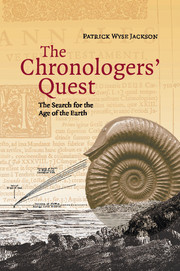Book contents
- Frontmatter
- Contents
- List of illustrations
- List of tables
- Preface
- Acknowledgements
- 1 The ancients: early chronologies
- 2 Biblical calculations
- 3 Models of Aristotelian infinity and sacred theories of the Earth
- 4 Falling stones, salty oceans, and evaporating waters: early empirical measurements of the age of the Earth
- 5 Thinking in layers: early ideas in stratigraphy
- 6 An infinite and cyclical Earth and religious orthodoxy
- 7 The cooling Earth
- 8 Stratigraphical laws, uniformitarianism and the development of the geological column
- 9 ‘Formed stones’ and their subsequent role in biostratigraphy and evolutionary theory
- 10 The hour-glass of accumulated or denuded sediments
- 11 Thermodynamics and the cooling Earth revisited
- 12 Oceanic salination reconsidered
- 13 Radioactivity: invisible geochronometers
- 14 The Universal problem and Duck Soup
- Bibliography
- Index
14 - The Universal problem and Duck Soup
Published online by Cambridge University Press: 02 December 2009
- Frontmatter
- Contents
- List of illustrations
- List of tables
- Preface
- Acknowledgements
- 1 The ancients: early chronologies
- 2 Biblical calculations
- 3 Models of Aristotelian infinity and sacred theories of the Earth
- 4 Falling stones, salty oceans, and evaporating waters: early empirical measurements of the age of the Earth
- 5 Thinking in layers: early ideas in stratigraphy
- 6 An infinite and cyclical Earth and religious orthodoxy
- 7 The cooling Earth
- 8 Stratigraphical laws, uniformitarianism and the development of the geological column
- 9 ‘Formed stones’ and their subsequent role in biostratigraphy and evolutionary theory
- 10 The hour-glass of accumulated or denuded sediments
- 11 Thermodynamics and the cooling Earth revisited
- 12 Oceanic salination reconsidered
- 13 Radioactivity: invisible geochronometers
- 14 The Universal problem and Duck Soup
- Bibliography
- Index
Summary
IS THE EARTH TOO OLD?
As we have seen, by the 1930s the geologists finally were reasonably happy, following much soul-searching and research, with the notion that the Earth was approximately 3,000 million years old. With this harmonious consensus, one might have imagined that the debate on the age of Earth would then have died down, and the whole topic would have been sent into retirement in some quiet backwater.
The geologists might have been pleased with themselves, but the astronomers were not, because they had decided that the Universe was 2,000 million years old. How could the Earth be 1,000 million years older than the Universe? This would certainly be impossible, and so the findings of the geologists must have been at fault: after all the astronomers had a long history of observations with which to reinforce their contentions.
Stephen Brush of the University of Maryland has dissected this topic in some detail, and notes that the scientists tackled the problems of the age of the Earth and Universe from four perspectives. They brought to bear atomic physics and the study of radioactivity as already noted; stellar astronomy in which research was being rapidly advanced through the development of larger and more powerful telescopes with which to scan the night sky; theoretical physics and cosmology, which is the science of the Universe as a whole; and planetary geology, the study of the planets of our Solar System.
- Type
- Chapter
- Information
- The Chronologers' QuestThe Search for the Age of the Earth, pp. 250 - 260Publisher: Cambridge University PressPrint publication year: 2006



